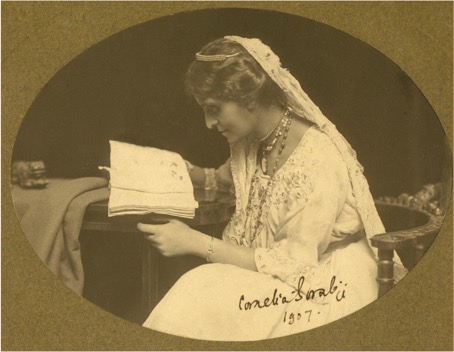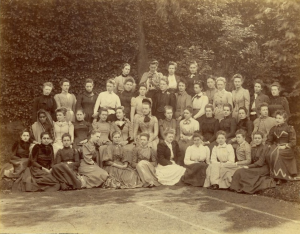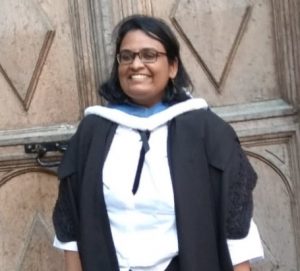2019 marks the 130th year since Cornelia Sorabji accepted her place to read Law at Oxford. She was the first Indian woman to study at Oxford, the first woman of any nationality to read law at Oxford and the first woman to practice law in both India and the UK. After passing the Jurisprudence exams in 1892, Sorabji returned to India to work on behalf of women living in purdah and later became a distinguished member of Lincoln’s Inn. She was only able to take up her place at Oxford thanks to the help of a subscription raised by progressive Indian and British men and women including Madeleine Shaw Lefevre, the first Principal of Somerville.
See documents on those who helped fund Cornelia Sorabji’s studies, including Florence Nightingale
Launched in 2016, the Cornelia Sorabji Law Programme, based at Somerville’s Oxford India Centre for Sustainable Development, supports talented Indian law students and seeks to produce a pipeline of outstanding legal talent for India. We have benefitted from wonderful support from the Supreme Court of India and from the Indian High Commission in London in launching this initiative. We are immensely grateful to the wonderful consortium of benefactors in India and in the UK for so generously enabling this opportunity for the students so far. We hope now to be able to secure the long-term future of the scholarship.
It is awarded to exceptional Indian students who intend to go to back to serve their country upon completing their studies. This year’s Cornelia Sorabji scholars, Aishwarya Amar and Aradhana Vaddekethil, are certainly doing their best to live up to this legacy.
AISHWARYA AMAR, 2018, BCL
Law is a versatile profession, and it embodies so many human endeavours like politics or social activism. Many people responsible for social reform, be it Mahatma Gandhi or Nelson Mandela, leveraged their legal educations to do what they did, Studying the law goes beyond just the discipline, and I hope to use my legal education to socially empower people in our country
We need to bring in a more empathetic approach to the law. People view it from a distance and are scared of it: criminal law or civil procedure, people do not really know what it is. The law needs to function at a level where everyone understands its importance in everyday life. I am interested in human rights law and environmental law – both are part of our day to day existence more than we realise, concerning things like the very air that we breathe. Law does more than just regulate: it builds people’s perceptions, it brings value to our daily lives. These two areas of law are very important, particularly in India today with its rapid pace of development
The Oxford India Centre at Somerville has given me the chance to interact with so many different people. Radhika, the director of the centre, has been a mentor to me as she works on the environment and climate change. The law and regulations do not exist in isolation. The environment is the domain of activists and scientists as well, and that is why you need an interdisciplinary approach. As lawyers, we are conditioned to think in a certain way, and it is interesting to speak to people who have looked at it things from a different angle.
I would not have been able to attend without the Cornelia Sorabji scholarship, and have benefitted from being part of the Oxford India Centre. The centre provides amazing opportunities. Last term, we interacted with Professor Barbara Harriss-White. This term we might be meeting the Indian High Commissioner. I feel like this is a once in a lifetime opportunity. Coming to Somerville opens a lot of doors, helps you interact with people established in their fields, and is also a warm environment. Somerville’s inclusivity and accepting everyone the way they allows people to tell their stories. Oxford keeps you busy, and after a long day it is nice to chat with members of Somerville’s close community in the MCR, with their varied interests and experiences. My friends from the BCL like coming here too, because it is so nice!
Somerville is college of strong women who pushed the boundaries imposed on them, like Margaret Thatcher and Indira Gandhi. This is such a critical juncture in India – Women are moving to higher positions in the judiciary, more women senior advocates are being appointed, and it is a great time to be able to contribute to this. Somerville encourages that, and it is such a boost to the thought process.
I am looking at doing some sort of policy work, some work with the government, and taking my understanding down to the grassroots level. My ultimate goal is to establish a practice in environment litigation in India, but for now I do see myself acquiring more knowledge and honing my skills before that venture. I knew this was what I wanted to do, but my experiences here and the help of the people of the centre have helped me figure out exactly how and when I would like to do so.
ARADHANA VADEKKETHIL, 2017, M.PHIL IN LAW
I joined Somerville in 2017, for the BCL and am currently on the M.Phil in Law, looking at the language and concept of consent in rape law judgements. The definition of consent was added in the 2013 criminal law amendment in India and I look at whether there has been progress in the way judgements have been decided. The 2013 amendment was more victim-centric, with greater focus on autonomy and women’s rights. I am looking at whether it is actually being implemented in courts, or whether they are still using stereotypes to arrive at an acquittal or a conviction. Through my research I hope to highlight how culturally dominant notions, underlying preconceptions and prejudices about rape (continue to) percolate through the talk of sexual assault cases in a variety of settings and ultimately shape their outcome. Over the D.Phil, I plan to expand this to cover all the sections pertaining to sexual harassment and rape law, with a particular focus on death penalty and child sexual abuse cases.
I have volunteered with Oxford Pro Bono Project since the BCL, looking at child sexual abuse , same sex marriage laws, and the death penalty. It showed me how comparative law enquiry can work, and how it could be deployed in India. Undergraduate courses tend not to focus on comparative law, even though the Supreme Court of India may rely on it. I liked the experience with the Pro Bono Projects so much that I interned with the Women’s Legal Centre in South Africa, through the Bonavero Institute of Human Rights scheme, and worked on laws pertaining to sexual harassment and sex workers rights. South Africa uses comparative law productively, and it was great to apply theoretical knowledge in real life. Inspired by that, I carried on with the Oxford Pro Bono Project, which I now co-chair. It is great how we can tap into the potential of students from so many different jurisdictions and can accumulate knowledge to help someone working in the field in another jurisdiction. This work and my thesis have kept me occupied over my M.Phil year.
I came to Oxford not knowing anybody in this country, and the warm welcome provided by the people at the Oxford India Centre, having someone to talk to in the same field, and in others, and the mentoring and guidance provided made all the difference. The Somerville MCR is another source of comfort and warmth.
The Cornelia Sorabji scholarship determined whether I was able to take up my place in the BCL and M.Phil programmes. In between programmes and worrying about funding, having the support and help of the people at the centre made the entire process less overwhelming. Somerville has encouraged me to push my boundaries – I wanted to do empirical research on one-stop centres for rape victims across India, and between the advice from my college advisor and financial support from the Margaret Thatcher centre, I am able to do this. I don’t think I would be able to do any of this as comfortably anywhere else but Somerville.
I would like to stay in academia and teach when I return to India, with a focus on criminal law and family law. Criminal law is the core of my work. It tends not to be taught from the intersectional perspective- caste, class, gender. I am coming to realise how family law is the basis of all other kinds of law, like how marriage, child custody, maintenance can have huge impact on gender-related law, criminal law, constitutional law etc. I realised this here at Oxford. Besides this, I would like to do some policy related work on rape legislation. I am coming to realise, as my thesis shows, that though the laws have changed, their implementation is still stuck in the 1980s. I want to work on figuring out how to manage this dissonance.
For more information on how to support the Cornelia Sorabji Law Programme, contact Sara Kalim at sara.kalim@some.ox.ac.uk
For supporters in India here are the details of the Oxonian India Foundation through which tax efficient rupee donations can be made.




